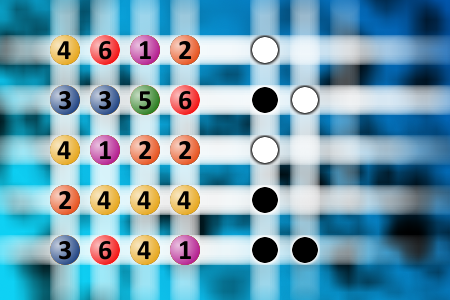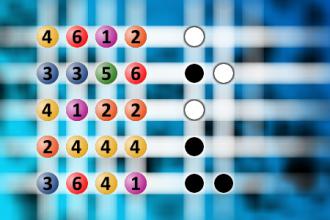Find the right combination
The computer chose a secret code (sequence of 4 digits from 1 to 6). Your goal is to find that code. Black circles indicate the number of hits on the right spot. White circles indicate the number of hits on the wrong spot.Correct answers: 8
#brainteasers #mastermind

A young Southern boy goes off...
A young Southern boy goes off to college, but about 1/3 of the waythrough the semester, he has foolishly squandered away all of the money hisparents gave him.
Then he gets an idea. He calls his daddy. "Dad," he says, "you won'tbelieve the wonders that modern education are coming up with! Why,they actually have a program here at college that will teach our dog OleBlue how to talk!"
"That's absolutely amazing," his father says. "How do I get him inthat program?"
"Just send him down here with $1,000" the boy says. "I'll get himinto the course." So, his father sends the dog and the $1,000.
About 2/3 way through the semester, the money runs out. The boy callshis father again. "So how's Ole Blue doing, son," his father asks.
"Awesome, Dad, he's talking up a storm," he says, "but you just won't believethis they've had such good results with this program that they'veimplemented a new one to teach the animals how to READ!"
"READ," says his father, "No kidding! What do I have to do to get himin that program? "
Just send $2,500, I'll get him in the class." His father sends themoney.
The boy now has a problem. At the end of the year, his father willfind out that the dog can neither talk, nor read. So he shoots the dog.
When he gets home at the end of the semester, his father is allexcited. "Where's Ole Blue? I just can't wait to see him talk and readsomething!"
"Dad," the boy says, "I have some grim news. Yesterday morning, justbefore we left to drive home, Ole Blue was in the living room kicking backin the recliner, reading the morning paper, like he usually does. Then heturned to me and asked, ' So, is your daddy still messin' around with thatlittle redhead who lives on Oak Street ?'
The father says, "I hope you SHOT that son of a bitch before he talksto your Mother!"
"I sure did, Dad!"
"That's my boy!"
Then he gets an idea. He calls his daddy. "Dad," he says, "you won'tbelieve the wonders that modern education are coming up with! Why,they actually have a program here at college that will teach our dog OleBlue how to talk!"
"That's absolutely amazing," his father says. "How do I get him inthat program?"
"Just send him down here with $1,000" the boy says. "I'll get himinto the course." So, his father sends the dog and the $1,000.
About 2/3 way through the semester, the money runs out. The boy callshis father again. "So how's Ole Blue doing, son," his father asks.
"Awesome, Dad, he's talking up a storm," he says, "but you just won't believethis they've had such good results with this program that they'veimplemented a new one to teach the animals how to READ!"
"READ," says his father, "No kidding! What do I have to do to get himin that program? "
Just send $2,500, I'll get him in the class." His father sends themoney.
The boy now has a problem. At the end of the year, his father willfind out that the dog can neither talk, nor read. So he shoots the dog.
When he gets home at the end of the semester, his father is allexcited. "Where's Ole Blue? I just can't wait to see him talk and readsomething!"
"Dad," the boy says, "I have some grim news. Yesterday morning, justbefore we left to drive home, Ole Blue was in the living room kicking backin the recliner, reading the morning paper, like he usually does. Then heturned to me and asked, ' So, is your daddy still messin' around with thatlittle redhead who lives on Oak Street ?'
The father says, "I hope you SHOT that son of a bitch before he talksto your Mother!"
"I sure did, Dad!"
"That's my boy!"

